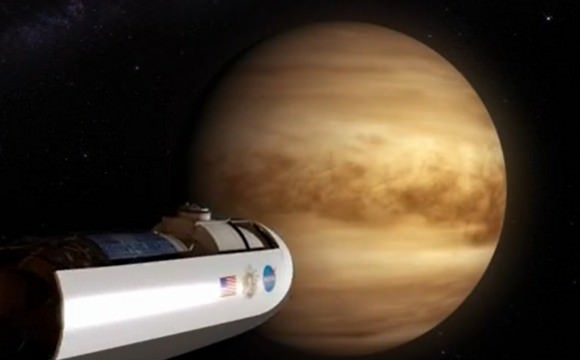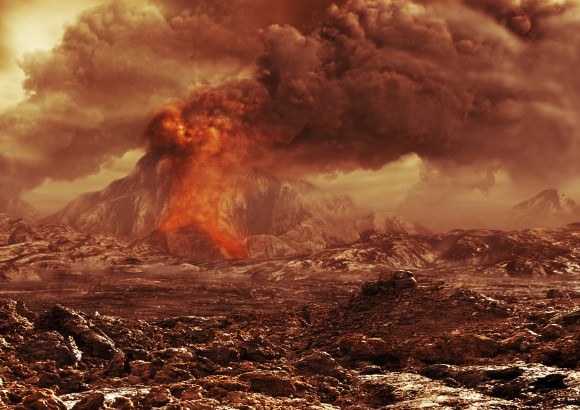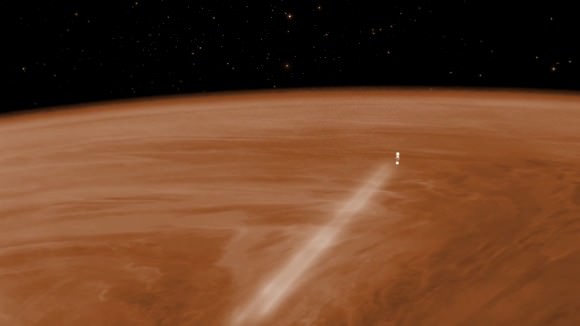Venus was once considered a twin to Earth, as it’s roughly the same size and is relatively close to our planet. But once astronomers looked at it seriously in the past half-century or so, a lot of contrasts emerged. The biggest one — Venus is actually a hothouse planet with a runaway greenhouse effect, making it inhospitable to life as we know it. Here are some more interesting facts about Venus.
1. Venus’ atmosphere killed spacecraft dead very quickly:
You sure don’t want to hang around on Venus’ surface. The pressure there is so great that spacecraft need shielding to survive. The atmosphere is made up of carbon dioxide with bits of sulfuric acid, NASA says, which is deadly to humans. And if that’s not bad enough, the temperature at the surface is higher than 470 degrees Celsius (880 degrees Fahrenheit). The Soviet Venera probes that ventured to the surface decades ago didn’t last more than two hours.
2. But conditions are more temperate higher in the atmosphere:
While you still couldn’t breathe the atmosphere high above Venus’ surface, at about 50 kilometers (31 miles) you’ll at least find the same pressure and atmosphere density as that of Earth. A very preliminary NASA study suggests that at some point, we could deploy airships for humans to explore Venus. And the backers suggest it may be more efficient to go to Venus than to Mars, with one large reason being that Venus is closer to Earth.

3. Venus is so bright it is sometimes mistaken for a UFO:
The planet is completely socked in by cloud, which makes it extremely reflective to observers looking at the sky on Earth. Its brightness is between -3.8 and -4.8 magnitude, which makes it brighter than the stars in the sky. In fact, it’s so bright that you can see it go through phases in a telescope — and it can cast shadows! So that remarkable appearance can confuse people not familiar with Venus in the sky, leading to reports of airplanes or UFOs.
4. And those clouds mean you can’t see the surface:
If you were to look at Venus with your eyes, you wouldn’t be able to see its surface. That’s because the clouds are so thick that they obscure what is below. NASA got around that problem when it sent the Magellan probe to Venus for exploration in the 1990s. The probe orbited the planet and got a complete surface picture using radar.

5. Venus has volcanoes and a fresh face:
Venus has fresh lava flows on its surface, which implies that volcanoes erupted anywhere from the past few hundred years to the past three million years. What this means is there are few impact craters on the surface, likely because the lava flowed over them and filled them in. While scientists believe the volcanoes are responsible, the larger question is how frequently this occurs.
6. Venus has a bizarre rotation:
Venus not only rotates backwards compared to the other planets, but it rotates very slowly. In fact, a day on Venus (243 days) lasts longer than it takes the planet to orbit around the Sun (225 days). Even more strangely, the rotation appears to be slowing down; Venus is turning 6.5 minutes more slowly in 2014 than in the early 1990s. One theory for the change could be the planet’s weather; its thick atmosphere may grind against the surface and slow down the rotation.

7. Venus has no moons or rings:
The two planets closest to the Sun have no rings or moons, which puts Venus in the company of only one other world: Mercury. Every other planet in the Solar System has one or the other, or in many cases both! Why this is is a mystery to scientists, but they are doing as much comparison of different planets as possible to understand what’s going on.
8. Venus appears to be a spot where spacecraft go to extremes:
We briefly mentioned the Venera probes that landed on the surface, but that’s not the only unusual spacecraft activity at Venus. In 2014, the European Space Agency put an orbiter — that’s right, a spacecraft not designed to survive the atmosphere — into the upper parts of Venus’ dense atmosphere. Venus Express did indeed survive the encounter (before it ran out of gas), with the goal of providing more information about how the atmosphere looks at high altitudes. This could help with landings in the future.
As you can see, Venus is an interesting, mysterious, and extremely hostile world. With such a corrosive atmosphere, such incredible heat, a volcanically-scarred surface, and thick clouds of toxic gas, one would have to be crazy to want to live there. And yet, there are some who believe Venus could be terraformed for human use, or at the very least explored using airships, in the coming generations.
But that’s the thing about interesting places. Initially, they draw their fair share of research and attention. But eventually, the dreamers and adventurers come.


I think this website is wonderful! there are many Resources you can use! guess wht it actuallyy helped in my project and i got a staright A+ cool!
this is stupid. im tryin to get a project done here and its like no offence but these facts arent the coolest things in the world 🙁
and i get what other people is saying some people is at diffrent ages so need more infor ation like me
this site is cool and all but it deffinetley needs more information on this page I used it for my research project and hardley got any new information that I didn’t already have because it pretty common information the I found here.
This website is cool. But it needs more information though.But i got an A+ on my Report! They have everything her for a Report or a REsearch project. But im hoping that they could put more information.
this website is pretty LEEEGGGIIITTTT!!!! hehe this helped me get an A- on my science report. thankkssss!!! l*-*l <— my video cassette
well the information isnt great but isnt terrible I like chocolate ^_^
______
| ____ |
|______| <— chocolate
noah needs to build another ark
Keeping to the topic, I think the fact that Venus has no global magnetic field is notable. Both in terms of the question of the rotation and the overall theme of a heavy atmosphere without a magnetic shield with more intense solar wind than Mars which had it’s eroded… Could all this be related to the young surface?
I’d be delighted to find out if there were any organics very high in Venus’ clouds, where both the pressure and the temperature allow for water to exist in small liquid droplets.
That politically motivated climate claim, might very well be the other way around. That Venus was created hotter and cooled when its water vapor, a much more potent greenhouse gas than carbon dioxide, left it. But for political reasons that hypothesis is of course disliked.
Where do you get the idea that climate science is politically motivated? I mean, yes, climate science *denial* is unquestionably politically motivated. There can be no dispute about that.
Why, just the other day, denialist poster boy Willie Soon was caught taking donations from fossil fuel companies, not disclosing his funding sources, and referring to his work as “deliverables” for those companies. As though he considers his work to be delivering a veneer of scientific validity to an ideological position- which is exactly what it is.
However, claims that climate scientists are also crooks who say what they’re paid to say just don’t hold up. Most climate scientists have to beg and scrape for tiny, barely adequate grants. Why would you do that, if you could be like Willie Soon and rake in millions to spout blatant drivel on behalf of the other side? Could it be that most scientists are more concerned with telling the truth as they see it, than whoring themselves out for corporations?
I put climate science denial on the same level as homeopathy, and the antivax movement, i.e., deluding people for money.
who are all these people who appear to be students doing research papers on planets or something commenting here? is this all the same person? very confusing
Judging by the grammar, I’m going to guess they are elementary school students at one of those touchy feely schools, where everyone gets an A, just for participating. That, or a liberal arts college.
Yes, one of those “Liberal Arts Colleges” like Williams or Haverford. Except most of the “Liberal ” graduates of those colleges are too busy running hedge funds to worry much about climate change.